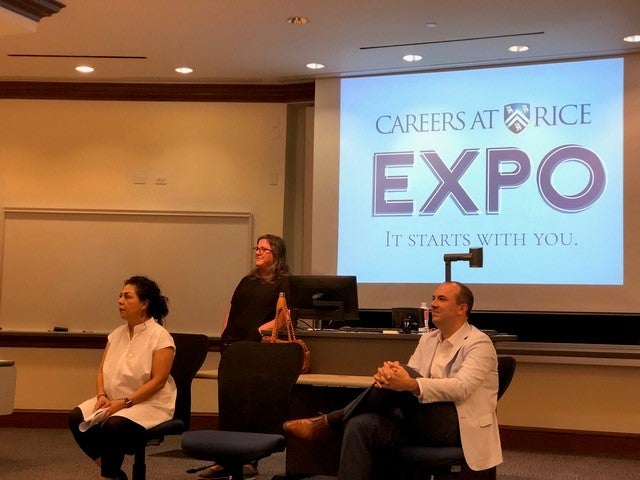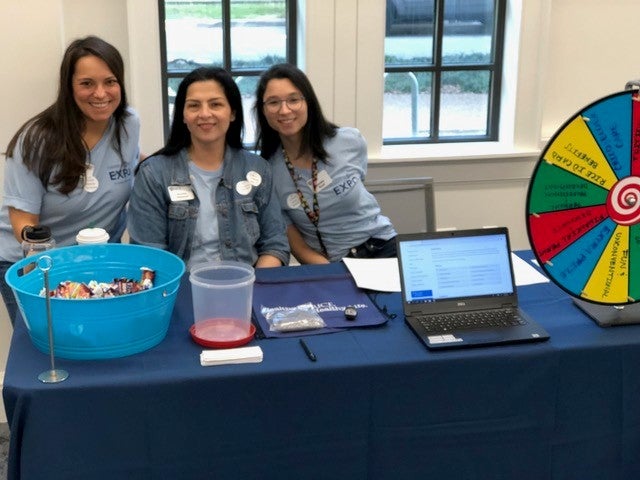Clear Career Paths
You can have a full and rewarding career at Rice. These tools and resources can help you to explore and identify your career goals and aspirations, determine your career path, and enable you to create development plans to grow your career at Rice.
What is Career Pathing?
Career stewardship is about being purposeful and proactive in taking ownership of your career. Ideally, career pathing occurs when an employee, in partnership with a supervisor or mentor, creates a clear course of action by identifying potential career opportunities along with development options to get there. Employees should examine their goals, skills, experience, etc. in detail in order to target specific career paths. More often, people are considering lateral moves in order to acquire specific skills and experience that will benefit their desired goals and plan for the future.
To begin, consider asking yourself the following questions:
- How fulfilled am I? To what extent do I find meaning and purpose in my work?
- How am I learning and growing? What competencies or developmental experiences do I need to gain as I look ahead?
- Am I headed in the right direction? What do I want in my work/life in three to five years? What are my non-negotiables?
- What one thing can I do now or next to gain clarification or momentum?
- What connections do I need to make within Rice and outside of Rice?
Job structure
The Rice job structure provides a framework for staff to fully understand the requirements of their current positions, explore career opportunities, create development plans, and build a career at Rice.
It is a system that organizes jobs into groups that share common functional responsibilities and similar types of education, experience, and skill requirements. the job structure will be reviewed regularly to ensure it contains the types of jobs and skills needed to meet the university’s needs.
Job Family
The job family is a large grouping of jobs of a similar nature, which includes a variety of specialties and varying levels of skills, complexity and scope of responsibility. Rice University has 12 job families. See Job Families and Subfamilies
Subfamily
Within each job family, there are smaller groupings of jobs called subfamilies. Subfamilies include occupational groups of jobs, or specialties, within a job family. For example, Administrative Operations, Compliance and Technology Transfer are all subfamilies within the Enterprise Services job family. Rice University has 114 subfamilies.
Job Category, Level and Classification
- Job Category
-
The university’s job structure is based on three categories of jobs: management, exempt individual contributor, and nonexempt individual contributor. Jobs in the management category emphasize the leadership and supervision of others as the primary responsibility. Jobs in the exempt and nonexempt individual contributor categories emphasize individual work contributions. Some staff in these categories may supervise one or two others, but their primary responsibility is to their own work contributions.
- Job Level
-
Each job category has three or four job levels, which reflect increasing levels of skill, mastery, work complexity, and decision-making authority within each job category. Rice University has 10 job levels across the three categories.
- Job Classification
-
Every staff job is assigned to a job classification based upon the type of work; the level of responsibility, complexity, and scope of the job; and job requirements (skills, education, experience, etc.).
Each job classification has a career profile. The career profile outlines the essential functions and requirements for job classification, which are consistent across the university. Career profiles will be used as the basis of describing jobs consistently and will enable staff members and their supervisors to chart out career development plans based on the listed job requirements (education, skills, experience).
Career Planning and Development
- It Starts With You!
-
Career development can be described as the lifelong journey of a person’s work identity and the big-picture view of someone’s ultimate career goal, which includes the years of education, training, jobs, and experience acquired.
It also entails awareness of his or her existing skills and what skills or knowledge are required for an aspired position and by the chosen industry, since the associated technological, political, cultural, etc. landscape changes rapidly. As a result, intentional reflection, exploration, networking, and outside-of-work activities contribute to an employee’s ability to attain his or her career goals.
Whether it is developing a personal brand, creating a career plan, or getting connected with other professionals, Rice hopes to support employees in their journeys. The following are examples of how we partner with employees:
- Facilitate connections with other Rice professionals, both one-on-one and in small group settings
- Provide workshops, coaching, etc. to support employees' career development competencies and enable them to assess strengths, explore possibilities, and utilize tools for planning and development.
We encourage all Rice employees to work with their supervisors to develop a plan that supports both professional and career development aspirations. Supervisors can assist by:
- offering feedback that is both performance and development-related;
- ensuring that each employee has the opportunity to develop skills and competencies for current and future roles;
- facilitating career coaching available for employees at Rice; and
- supporting career development overall and connecting employees with resources
Visit the Organizational and Talent Development page for more resources.
Review policies on tuition reimbursement and tuition waiver/auditing courses at Rice.
- Phases
-
Career Planning is the continuous process of:
- assessing and reflecting on your interests, values, skills and preferences;
- exploring the life, work and learning options available to you; and
- ensuring that your work fits with your personal values and circumstances
5 Ways to Take Initiative in Your Career Development
Assessment
Self-Assessment is a key step in identifying where you are professionally and how to use your strengths to reach your professional and career goals.
Tools and Resources
- Career Conversations Start With a Single Question
- Personal Brand Questionnaire
- Leveraging Strengths
- Values Identification
- 28 Top Interpersonal Skills in 2022
Alignment
- Job Crafting
- Informational Interview
- Former Google Coach Figures Out Four Secrets to Finding Out What You Want to do
Acceleration
- Helpful Tips and Resources
-
Review your current career profile.
The career profile is a description of the essential functions and requirements for a job classification, which is consistent across the university. Career profiles will be used as the basis for describing jobs consistently and will enable staff members and their supervisors to discuss expectations and developmental needs for staff’s current positions and chart career development plans based on the listed job requirements (education, skills, experience) for positions that staff may be interested in pursuing in the future.
Partner with your supervisor and/or find a trusted colleague or mentor.
- Careers At Rice EXPO
-
Careers At Rice EXPO
We believe that everyone should have a fulfilling career at Rice University! That’s why we created the Careers at Rice Symposium and Expo – an event for staff to explore the resources and opportunities to grow and thrive at Rice.

Panel discussion 
Spin the Careers At Rice wheel
Career Coaching
- Individual Coaching
-
Individual Career and/or Leadership Coaching for employees is available and scheduled based on coach availability. All of our Rice internal coaches have completed the CoachRice program offered by the Doerr Institute for New Leaders.
This program is currently on pause.
- Coaching Circles
-
Coaching Circle - Career Development
The Career Development Coaching Circles are facilitated in small groups (8-10 participants) for 7 sessions (2 hours each). Goals of the program include:
- providing a space for peer, action-oriented learning, career exploration and coaching;
- facilitating peer connections (across schools and divisions) and expanding each participant's network;
- developing competencies pertaining to effective career planning and development and exercises to reinforce and apply newly acquired skills;
- increasing self-awareness and accountability for professional development;
- brainstorming ideas and techniques and sharing a range of tools and resources that are conducive to career progression.
Coaching Circle - Leadership Development
The Leadership Development Coaching Circles are facilitated in small groups (8 – 12 participants) for 6-8 sessions (2 hours each) depending on the topic or focus of each circle. Goals of the program include:
- providing a space for learning leadership competencies with a small group of peers and collaborating on common leadership challenges;
- applying leadership competencies and skills through discussion, exercises and accountability groups;
- developing awareness pertaining to potential leadership blind spots and/or career-limiting behavior;
- expanding leadership capacity at Rice by offering another component to current leadership development options;
- facilitating peer connections (across schools and divisions) and expanding each participant's network;
- brainstorming ideas and techniques while also sharing a range of tools and resources that are designed for leader development
